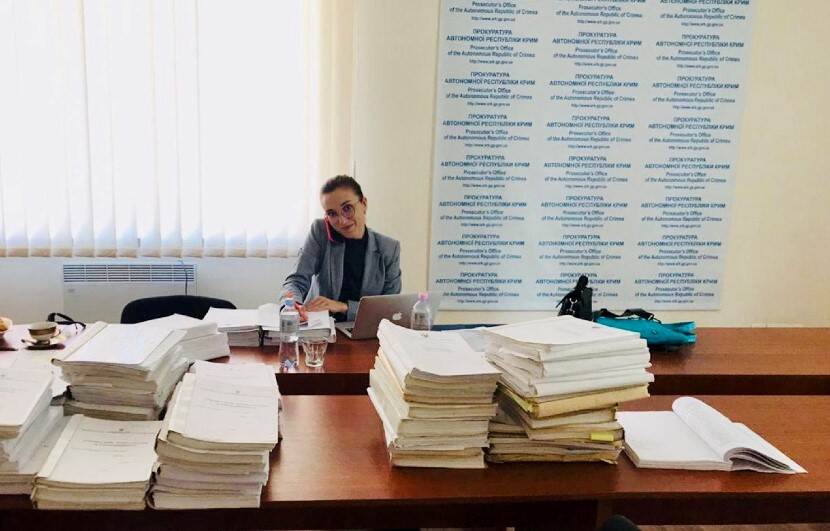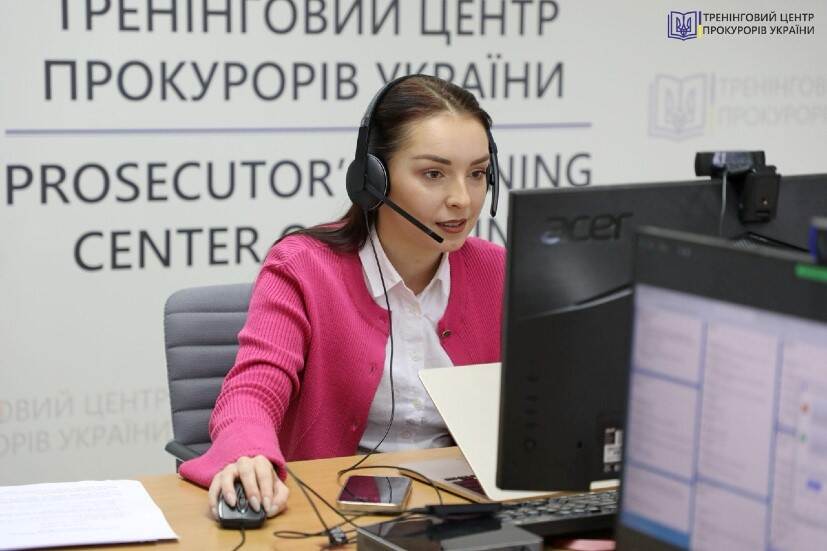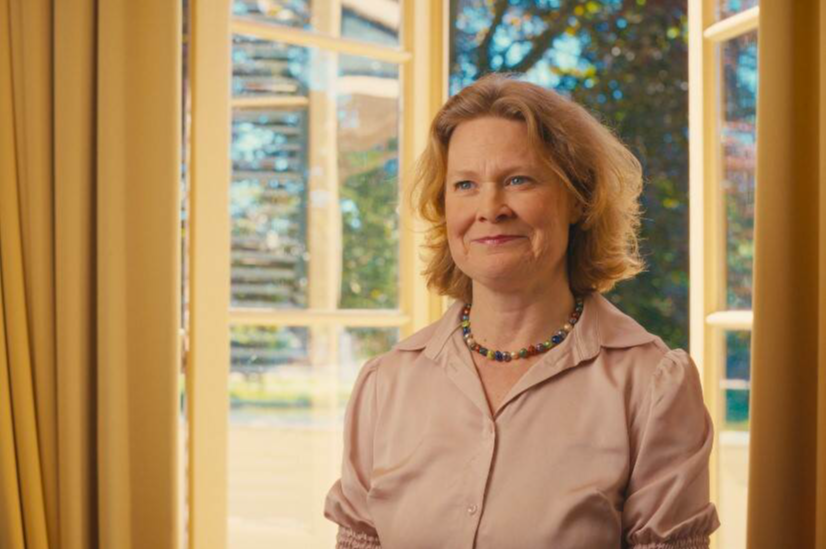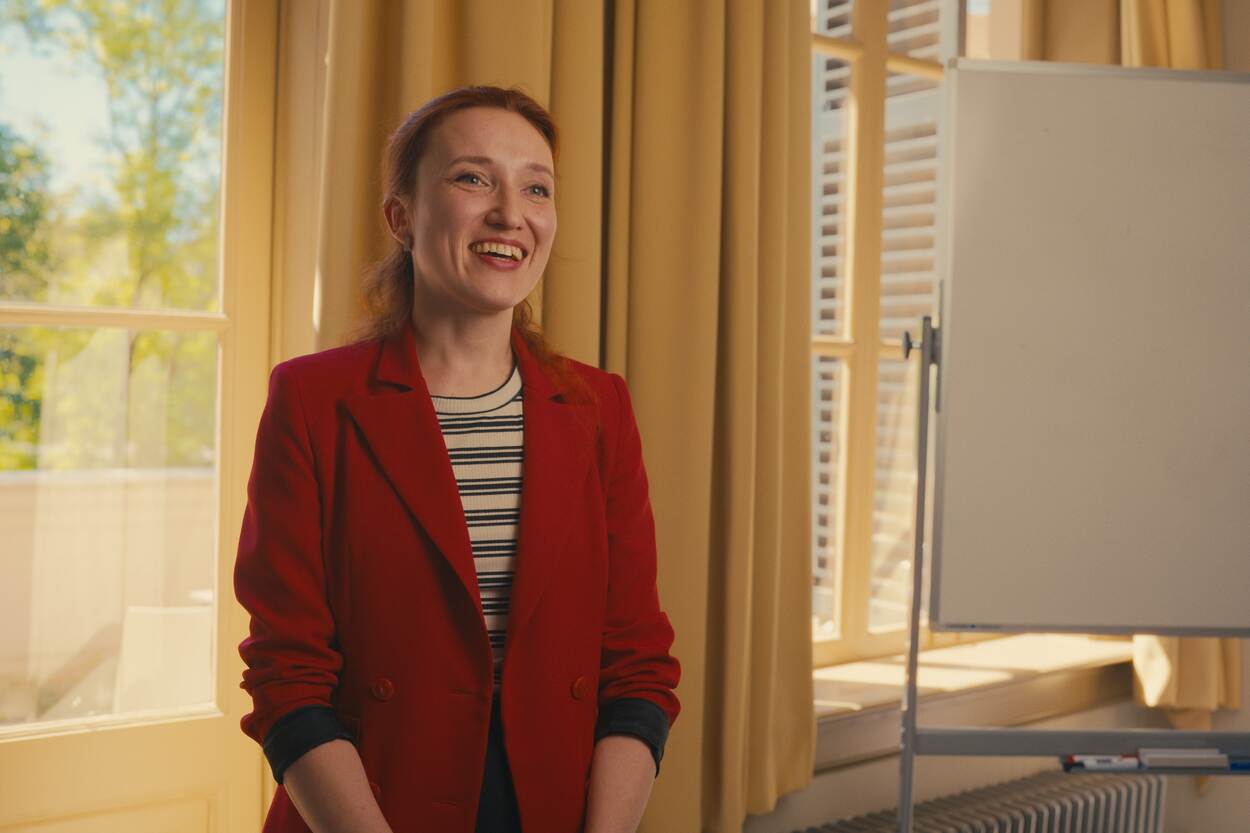The Netherlands supports Ukraine’s fight for justice - Ukraine
The Netherlands supports Ukraine’s fight for justice
Valeriia Melnyk and Eleonora Belei from Ukraine are enrolled in the advanced master’s programme in international law at Leiden University. But Valeriia and Eleanora are not like other students. They dedicate their evenings and weekends to their continued fight against impunity – helped by their newly acquired knowledge.
This means emailing and calling their colleagues at the Prosecutor General’s Office in Ukraine, where they are still working. Valeriia heads the international cooperation division; her colleague Eleonora is in charge of strategic planning and coordination.
Destroyed neighbourhoods, schools and hospitals; tortured and murdered soldiers and abducted children. Over 160,000 war crimes have been registered in Ukraine. The Netherlands wants justice for the Ukrainian people and believes these crimes should not be allowed to go unpunished.
That is why the Netherlands is supporting Ukraine’s justice sector. Both financially and with knowledge. As part of this, the Dutch government is funding the studies of three experienced staff members from the Ukrainian Prosecutor General’s Office, via the Leiden University Fund. After completing the one-year advanced master’s programme in international law at Leiden University, they will return to Ukraine to put their newly acquired knowledge into practice investigating and prosecuting international crimes.
Knowledge and public prosecutors in high demand in Ukraine
‘Following the invasion in 2022, it quickly became clear that professional and internationally oriented public prosecutors were going to be in high demand,’ Valeriia explains. ‘During my law degree in Ukraine and later, in my work at the Prosecutor General’s Office, my focus was always on international cooperation. When war broke out, we soon realised that we needed more specific knowledge. Our rights were being violated, but who could we turn to? How does international law work in practice when your country is at war?’
Eleonora: ‘Bombs were falling, public services and daily life were turned upside down. War crimes became commonplace. That’s not something a law degree prepares you for. I knew straight away I needed to enhance my knowledge.’
Still, it was no easy decision to accept the invitation from Leiden University and the Dutch Ministry of Foreign Affairs. Eleonora: ‘It’s hard leaving your family and friends behind, especially at a time of war. And I was head of strategy and planning. A senior management position like that means a lot of responsibility on the ground. But I’m glad I was able to come in the end.’
Legal lessons for Ukraine
‘What have I learned at Leiden University? There’s so much!’ Valeriia says. ‘I have an even better understanding now of the workings of international law in the broadest sense. But specific knowledge too, like which legal mechanisms are available to Ukraine. There are some international organisations I’d never even heard of. I have a much better idea now of the different organisations’ mandates and competences. And how they can help us in our fight for justice in Ukraine.’
Sharing real-life experiences: win-win
As well as gaining knowledge and skills, Valeriia and Eleonora could share their own real-life experiences with other students and their lecturers. ‘That is the express purpose of this advanced master’s programme,’ says Larissa van den Herik, Professor of Public International Law at Leiden University. ‘We want to bring people who already have a good deal of professional experience to the next level in the field of international law. Through lectures by experts in the field, through assignments, but also by sharing experiences. It’s a win-win situation: individual students, the group as a whole and the university benefit from learning about specific examples from real life. It’s enriching for us too.’
Administration of justice is tough in a country at war
Professor Van den Herik: ‘Valeriia and Eleonora’s fellow students have gained a much better understanding of how tough administration of justice can be in a country at war.’ This year the group following the advanced master’s programme in international law consisted of 32 students from around the globe – from Japan to Panama.
‘Hearing about war first-hand is different to reading about it,’ Valeriia points out. ‘It made a deep impression when we spoke about the time we were stuck in a bomb shelter with sirens wailing above our heads and no electricity during a massive attack on civil infrastructure. Luckily we could still access the internet on our mobile phones and were able to get in touch with our partners.’ In Ukraine these attacks are commonplace.
Real-life applications
Valeriia and Eleonora are keen to put everything they have learned in Leiden into practice in their day-to-day work at the Prosecutor General’s Office in Kyiv. Eleonora: ‘It’s unbelievably important that we show the world that crimes such as torture, rape and murder do not go unpunished. And that the perpetrators do not get away with them. We must bring perpetrators to justice in a way that makes the victims of these atrocities feel heard, seen and recognised.’
Broad support from the Netherlands
The Netherlands supports Ukraine in its efforts to achieve
recognition and justice for the victims of war crimes and plays a
leading role with regard to supporting ‘the restoration of Justice’ as
one of Ukraine’s top priorities. Since the start of Russia’s war in
2022, the Netherlands has made substantial contributions in this
regard.
Valeriia points out that the Netherlands also plays
an important part in the fight for justice by hosting international
courts such as the International Criminal Court and the International
Court of Justice in The Hague. The fact that the Netherlands actively
advocates for both compensation of Ukrainian victims by Russia for the
damages suffered and the establishment of an aggression tribunal to
prosecute the leaders responsible for the war (i.e. the crime of
aggression), is in keeping with this.
Valeriia and Eleonora have experienced broad political, economic and moral support from the Dutch government.v ‘And it’s not only the government,’ Valeriia says.
'People at the university, but even just people in the street. When I’ve told people where I’m from I’ve always felt sympathy and support. I’m very grateful for that. And for the opportunity to come and study here.’
Eleonora is also grateful for the role the Netherlands plays internationally in combating impunity, and for the opportunity to study in the Netherlands for a year. Both women are finding life in the Netherlands peaceful and calm, which makes it easier to concentrate on their studies.
Eleonora wears an eye-catching blue-and-yellow
brooch made by a Ukrainian goldsmith, which represents
Ukrainian grain. ‘Many of the crimes committed target our
food security. Whole granaries have been destroyed by bombs.
This has hit not only our country, but the many countries we
export to as well.’
No peace without justice
The two women will be returning to Kyiv soon. Eleonora smiles: ‘I can almost smell the blossom already. Kyiv is so beautiful at this time of year.’ They are looking forward to embracing their parents, family members and friends again, of course. But they are also ready to throw themselves back into their work. Valeriia concludes: ‘I’ve learned so much here, gained so many new contacts. I’m going to need all of this in my fight again war crimes. Because we all know: there is no peace without justice.’
Dutch support for UkraineFor three years now, Ukrainians have been fighting for their freedom, and thus also for European security. The Netherlands supports Ukraine by financing the provision of humanitarian aid, reconstruction, aid to victims, medicines and supplies. It also supports investigations of violations of human rights and international humanitarian law. Want to find out more? See also: |




